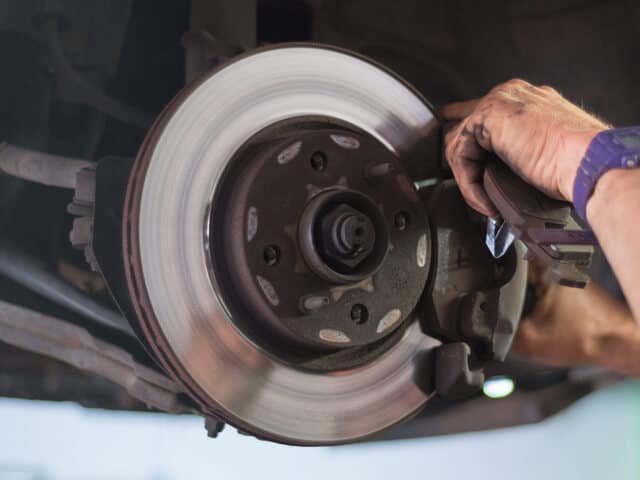Have you ever had to halt your car on the side of the road because it was taking too long to stop? Rear brakes frequently have issues like this, intended to prevent the automobile from going backward. Front brakes might not always function as anticipated, nevertheless.
If your front brakes work but not rear, you may be unable to stop in time for an emergency or avoid a collision.
This issue can cause traffic problems, as well as safety concerns. In some cases, faulty rear brakes can even lead to a car crash.
Therefore, if you have been experiencing issues with your rear brakes, it is essential to take action and check them out.
A mechanic can fix back brake problems relatively quickly and will likely save you from further trouble down the road.
Front Brakes Work But Not Rear
Rear brakes have been proven to work more effectively than front brakes. This is because the rear brakes are activated by the car’s weight, while the front brakes are only used to stop the vehicle from moving forward.

For instance, If you are driving a car and experience a sudden stop, your car’s front brakes may work fine. However, the rear brakes may not work.
The rear brakes may not work because they are not designed to work in this situation. The solution to this problem is to install rear brake pads that are made explicitly for stopping in a sudden stop.
Rear Brake Problems And Solutions
We always recommend using both the front and the rear brakes. However, some individuals may find that their rear brakes do not work as well as their front brakes.
This is likely due to several factors, including worn or corroded parts. If this is the case for you, there are a few solutions that you can try.
If your rear brakes are not working correctly, you may be able to fix the problem by performing a brake fluid flush.
This will remove any old or dried-out brake fluid from your system, which may help improve performance. Additionally, you can check to see if your brake pads are worn down or if there is any corrosion on the discs or pads.
If either of these things is true, you may need to replace them to get your car stopped adequately.
In rare cases, however, the problem with your rear brakes may be more complicated than just worn-down parts.
In these cases, you may need to take your car to a mechanic for a more in-depth diagnosis. However, even in these cases, there are usually ways to fix the problem without going through a mechanic.
Why Is My Rear Brake Not Working? What to Check
If you’re having trouble with your rear brake not working, there could be a few reasons. First, it’s essential to check that the brake line is adequately connected to the brake caliper.
If the line is disconnected or appears kinked, the brake may not be able to function correctly. Second, the brake pads may have worn out and need to be replaced.
Finally, if your car has ABS (anti-lock braking system) functionality, ensure the rear brake sensors are working correctly by checking for a warning light or sound indicator on your dashboard.
When Stopping, Which Brakes Apply Pressure First—The Front Or The Rear?
The answer is both. Rear brakes work when front brakes are first applied, but these front brakes apply pressure first in stopping the car’s motion.
Why? In a traditional car, the rear wheels are typically smaller than the wheels in front, so the minimum force is needed to stop the vehicle.
The friction between the brake pads and the rotor creates a braking force that pushes the car backward. The giant front wheel can then grab onto the pavement and stay put, thanks to its greater weight.
Front Brakes vs. Rear Brakes: Why Are They Different?
When it comes to braking, most people first think of the front brakes. This is because they are usually in front of a car.
But what about rear brakes? Are they just for decoration? On the contrary, the brakes towards the rear play an essential role in stopping a vehicle. Here’s why:

These rear brakes are located on the back of a car. This is where they attach to the axle that connects to the back wheels. When you apply pressure to the pedals, this axle turns, which causes the rear wheels to stop rotating.
Since rear brakes are located on the back of the car, they work better when you’re going downhill or when there’s a lot of snow or mud on the ground. However, when you’re going uphill, your front tires will lose traction first, and the back tires will follow suit.
So, if you’re ever wondering why your car’s rear brakes don’t seem to work as well as its front ones, it’s probably because you’re using them in an inappropriate situation. For best results, use your rear brakes only when necessary!
How Do Rear Brakes Function?
Rear brakes work by using the same hydraulic fluid as the front brakes. The brake booster signals towards the brake at the rear drums when you depress the pedal. This sends hydraulic fluid through the lines to reach to rear brake pads and slows down your car.
What Would Cause Rear Brakes To Wear Out Quickly?
Rear brakes are designed to stop a car using the friction created when the brake pads rub against the rotors.
Various factors can cause wear and tear on these parts, but one of the most common is moisture. When rain or snow gets between the brake pad and rotor, the friction that was once stopping the car quickly dissipates.

This causes the pads to wear out faster, as they must work harder to maintain an equal level of friction. Another cause of rear brake wear is incorrect installation.
For example, if the caliper is installed too low on the rotor or if there’s too much play in the system, it will result in excess wear on the brakes.
Conclusion
To sum up, all that has been said thus far, front brakes work but not rear might cease working for various reasons, such as when the brake line is occasionally not adequately attached to the brake caliper.
Because the brake won’t work correctly without the cable attached, investigate the cause of the rear brakes failing.
Simply flushing the brake fluid may be enough to solve the issue. But you must take your automobile to the mechanic if the problem recurs or is not resolved the first time.



